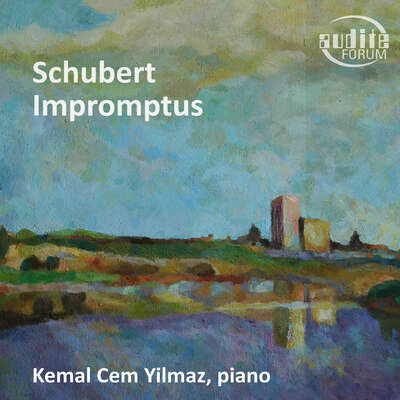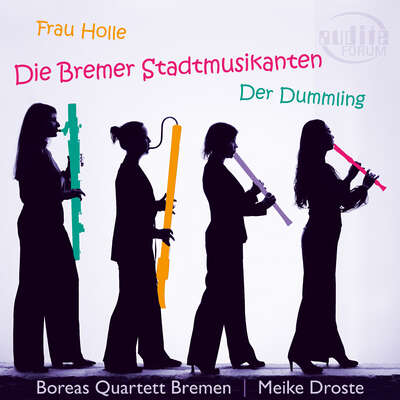
Auto-Rip
Continuing a much-acclaimed series of recordings: in the wake of Sardanapalo, Kirill Karabits and the Staatskapelle Weimar are devoting themselves for the first time to major works by Weimar’s Kapellmeister-composer, Franz Liszt, with his Dante and Tasso. His Künstlerfestzug is a world-premiere recording.more
Staatskapelle Weimar | Knabenchor der Jenaer Philharmonie | Damen des Opernchores des Deutschen Nationaltheaters Weimar
Kirill Karabits
"Kirill Karabits delivers exciting, beautifully polished interpretations of the three works; the one of the Künstlerfestzug is a world premiere recording." (Pizzicato)
Track List
This bonus track is only available as a download!
Details
| Franz Liszt: Künstlerfestzug - Tasso - Dante Symphony | |
| article number: | 97.760 |
|---|---|
| EAN barcode: | 4022143977601 |
| price group: | BCA |
| release date: | 10. January 2020 |
| total time: | 116 min. |
Bonus Material
Informationen
Deep emotions and sombre laments, the torments of Hell and the radiance of Paradise, and the sounds of celebration: the Staatskapelle Weimar and Kirill Karabits are continuing their partnership on the audite label with Franz Liszt's symphonic poem Tasso. Lamento e Trionfo, his Symphony to Dante's 'Divina Commedia' and - a world-premiere recording on CD - his Künstlerfestzug zur Schillerfeier. Their three previous releases have all been acclaimed by the press. The works that Liszt wrote for the Weimar Hofkapelle in the 1850s are the very embodiment of a Romantic ideal, combining literature, philosophy and the visual arts to create emotionally intense music that is turned both towards tradition and to the future.
With this Liszt release, audite also presents the first recording of the melodrama Vor hundert Jahren, for which his Künstlerfestzug was initially meant as a prelude. This work is available as a music download and stream on all current platforms and on www.audite.de.
Reviews
Fono Forum | Januar 2021 | Andreas Friesenhagen, Norbert Hornig, Matthias Kornemann | January 1, 2021
Kritiker-Umfrage 2020
Welche fünf CDs haben Sie im vergangenen Jahr am meisten beeindruckt?
Andreas Friesenhagen: Liszt: Gante-Symphonie, Tasso, Lamento e Trionfo, Künstlerfestzug; Staatskapelle Weimar, Kirill Karabits (Audite).<br /> „KirillMehr lesen
„Kirill Karabits stellt Liszt mit herrlichen Orchesterfarben und leuchtender Textur als Klangzauberer dar, als Poeten des Orchesters.“
Norbert Hornig: Fantasque- Violinsonaten von Faure, Debussy, Ravel & Poulenc; Franziska Pietsch, Josu de Solaun (Audite).
„Hoch expressive und eloquente Lesarten zentraler Werke des französischen Repertoires für Violine und Klavier.“
Matthias Kornemann: Schubert: Klaviersonate D. 960, Klavierstücke D. 946; Andrea Lucchesini (Audite).
„Lucchesinis Schubert-Spiel ist von einer fast altmeisterlichen Gelassenheit und steht mit seiner nobel untertreibenden Gestaltungskraft ziemlich einsam da.“
„Kirill
www.artalinna.com
| 8 AUGUST 2020 | Jean-Charles Hoffelé | August 8, 2020 | source: http://www.artal...
LE DISQUE DU JOUR
INFERNO
Magnifique album, qui prend à la gorge aussi les escarpements de Tasso et révèle le rare Hommage à Schiller, musique d’apparat grandiose où passe le souvenir de Berlioz.Mehr lesen
American Record Guide | August 2020 | Roger Hecht | August 1, 2020
In 1847 while touring as a pianist in Kiev, Liszt met Polish Princess Carolyne of Sayn–Wittgenstein, who became his companion for the rest of hisMehr lesen
As a young man, Liszt was already an admirer of Dante Alighieri's Divine Comedy. In the 1840s he considered writing a chorus and orchestra work drawn from it, accompanied by a slideshow of scenes from the poem by German artist Bonaventura Genelli, but nothing came of it. In 1849, he composed Apres une Lecture du Dante: Fantasia quasi Sonata (the Dante Sonata) for piano. In 1855 he began the Dante Symphony based on the 'Inferno' and 'Purgatorio' sections of Dante's poem. He completed it in 1857.
The work begins with Virgil and Dante descending into the Inferno. Liszt supplied no text save for the Magnificat, but he included a few lines from the poem under score staves to guide the conductor's interpretation, most notably the opening brass motifs to the rhythms of the text over the Gates of Hell. Raging downward figures in the low brass follow and then a quiet section where Virgil and Dante meet adulterous lovers Francesca da Rimini and Paolo Malatesta. (Francesca was married to Paolo's brother, Giovanni. Their affair lasted ten years until Giovanni caught and killed them.) In sublime woodwind passages through a rapturous passage for strings, Francesca tells Dante their story, and he faints in despair. After a funereal chant in the muted horns, the descent into Hell resumes in the brass, followed by a soft menacing march and a thunderous conclusion. Many of those themes reappear in 'Purgatorio', which opens with a mysterious nocturnal pastorale with reflective woodwinds, a chantlike beautiful chorale, and urgent strings. A slow fugue (with touches of Berlioz) depicts Dante's journey up the Mountain of Purification. Liszt intended to describe Dante's arrival in 'Paradisio', but after son–in–law Richard Wagner convinced him that no composer can create an image of Heaven, he seamlessly turned the chorale into a Magnificat that Dante observesfrom the mountain. Carolyne urged Liszt to compose a loud, triumphant ending, which he did; but when Wagner objected, Liszt turned the new ending into a coda that can be tagged onto the original ending. Few conductors, Karabits included, use it.
For more on this fascinating work, consult Steve Haller's reviews (J/A 2011, J/A 2005, S/O 2009, M/J/2013) and Don O'Connor's perceptive introduction to the Liszt Overview.
This performance is sleek. The slightly blended texture of the opening to 'Inferno' maintains the weight of the low brass but mitigates its bite. In some performances those downward passages cut through so powerfully that one can imagine two giant hands pounding on Liszt's piano, but here they are more blended. The quiet midsection, beautifully played by winds (especially) and strings, could be more expressive and dig in more, but Karabits's reflective and narrative approach in an air of suspension works. The ending is similar to the opening. 'Purgatorio' maintains the suspended quality beautifully, but some performances are more expressive and urgent here. The fugue is refined and clearly drawn, though the violins are sometimes too bright. Busier scoring creates the impression of speeding up, but Karabits holds to his tempo. Liszt called for a female or boys chorus for the Magnificat. Karabits uses both, with the solo sung by boys. The composer also wanted the chorus out of sight. I doubt that is the case here, but the effect is Heavenly enough, and the work evaporates quietly away.
Karabits's sleek and polished Dante Symphony did not appeal to me at first, but it has grown on me a great deal, and it presents an interesting contrast with the heavier, more dramatic Sinopoli, Barenboim (N/D 1994 & 2011), Lopez–Cobos (J/A 2001), and Roth (M/J 2013), the ones favored by most ARG critics. (The Roth is with the period Les Siecles group that I have been critical of, but they are quite good here.) I have not heard the favorably reviewed Ahronovitch (J/A 2011), Haenchen (J/A 2005), and Noseda (S/O 2009). Not reviewed is the heavyweight Masur, which is exciting and gripping, if sometimes hurried in the slower places.
Liszt wrote Kunstlerfestzug zur Schillerfeier (Artist Pageant for a Schiller Celebration) for the 1857 unveiling of Ernst Rietschel's statue of Goethe and Schiller in front of the Weimar National Theater, but the work was not actually played until an 1859 celebration of Schiller's birth. Its controlled festive nature is structured in fast–slow–fast sections. It is based on themes from another Liszt Schiller piece, Die Ideale, and it sounds like a condensation of that. This is its only recording.
Lord Byron's Lament of Tasso (1856) fired Liszt's interest in the Italian poet, Torquato Tasso and led to this symphonic chronicle. The work is based on an Italian gondolier's song Liszt used in 'Chant du Gondolier' from Venezia e Napoli. The opening depicts Tasso's sufferings in an insane asylum where he was committed after behavioral problems as court poet of the House of Este in Ferrara, Italy. His life with the Estes is depicted in a lovely minuet that makes up the midsection. The third part describes his triumphal visit to Rome just before he died. Karabits achieves the right celebratory feeling in The Rome music, but the opening could use a greater touch of madness, and the minuet is dull. Alternatives include Silvestri (J/A 1999), Ferencsik (J/A 2005), Noseda (J/F 2006), Botstein (with a poor Dante M/A 2004), Fruhbeck de Burgos (in the Overview but not recommended by Haller—S/O 2001), Masur, and Ivan Fischer.
The engineers handle the churchlike acoustic of the Congress Centrum Neue Weimarhalle by exchanging some detail for ambiance in a way that suits the performances well. Just make sure the volume is high enough. Nicolas Dufetel's good notes would be improved by more on Dante.
This is the second Franz Liszt recording from Karabits and the sleek sounding orchestra with touches of Czech string sound.
Klassiek Centraal | 6. juli 2020 | Erik Langeveld | July 6, 2020 | source: https://klassiek... Audite realiseert CD met hoogtepunten van Franz Liszt
In augustus 1841 bereikte de gekte rond Franz Liszt een hoogtepunt. De klavierleeuw liet zich in een koets met zes witte paarden rondrijden doorMehr lesen
Het jaar daarop kwam de Lisztomania zoals Heinrich Heine de heisa rond Liszt treffend noemde, tot een abrupt einde. Moe van het lege virtuozenbestaan trok Liszt zich terug in Weimar waar hij het geluk had aangesteld te worden als Kapellmeister. Het werd het begin van een vruchtbare periode die duurde tot 1861.
Vrijwilligers gezocht
Liszt herwerkte in die tijd niet alleen tal van zijn pianowerken maar gaf ook zijn ideeën over programma muziek en de band tussen poëzie en muziek definitief gestalte. In Weimar componeerde hij enkele van zijn belangrijkste werken.
De op deze cd gepresenteerde composities stammen allemaal uit die periode. Ze bieden een representatieve doorsnede van zijn orkestwerken: een gelegenheidswerk, een symfonisch gedicht en een uitgebreid symfonieprogramma. De luisteraar krijgt een treffend beeld van Liszts veelzijdigheid en baanbrekende creativiteit.
Schillers verjaardagsfeest
Die Künstlerfestzug zur Schillerfeier, geschreven ter gelegenheid van Schillers honderdste geboortejaar in 1859, plechtig en heroïsch van karakter is de perfecte opwarmer. Een aantal muzikale elementen die we hier horen, gebruikte Liszt ook voor zijn andere op Schiller geïnspireerde werken zoals Ideale en An die Künstler. Het lyrische thema in de hoorn dolce en expressivo, aanvankelijk door strijkers en harp begeleid en vervolgens door het hele orkest overgenomen, is zo’n voorbeeld van een ‘Schillermelodie’.
Tasso de pechvogel
Tasso Lamento e Trionfo is een symfonisch gedicht, een muzikale vorm waar Liszt de uitvinder van was en waarin met muzikale middelen een buitenmuzikale werkelijkheid wordt opgeroepen.
De renaissancedichter Tasso was volgens Liszt de belichaming van de gekwelde dichter: tijdens zijn leven miskend, achtervolgd door tegenslag, slecht behandeld, opgesloten in een gekkenhuis, maar postuum glanzend als een oogverblindende ster.
Alle aspecten van dat gekwelde kunstenaarsleven zijn terug te vinden in dit symfonische gedicht, een meesterlijke verklanking van lijden en postume triomf. We volgen onze held over de lagunes van Venetië, bezongen door de gondeliers, vervolgens naar het hof van Ferrara waar hij zijn meesterwerken schreef en tot slot naar Rome waar hij tot dichter der dichters gekroond werd en – te laat – erkenning kreeg voor zijn werk.
Een klagelijke, weemoedige, eentonige melodie volgt de melancholieke rondzwervende dichter die nergens thuis is. Een melodie die op Lisztiaanse wijze onder allerlei vermommingen de meest verschillende gedaantes aanneemt. We horen diepe terneergeslagenheid, melancholie, meditatie en krijgshaftige uitbarstingen uitmondend in de triomf die de dichter pas na zijn dood mocht smaken. Hier bespeelt Liszt de gevoelens van de luisteraar op geraffineerde wijze met zijn rijke gevarieerde instrumentatie, accenten en klankkleuren.
Tasso was oorspronkelijk bedoeld om Goethes honderdste verjaardag in 1849 luister bij te zetten, maar het werk oversteeg de gelegenheid volkomen en ging de geschiedenis in als een eerbetoon aan een held van de wereldliteratuur.
De hel van Liszt
Klapstuk van deze cd is de Symphonie zu Dantes Divina Commedia ook wel kortweg Dante Symfonie genoemd. Dit is Liszts vertaling van Dantes Divina Commedia in muziek.
Een curieus werk dat slechts uit twee delen bestaat: Inferno en Purgatorio. Op advies van zijn schoonzoon Richard Wagner liet Liszt een slotdeel Paradiso achterwege. Immers welke sterveling zou in staat zijn om een beeld van het Paradijs te schetsen? Liszt – niet voor één gat te vangen – loste dit probleem op door het Purgatorio naadloos te laten aansluiten op een door een sopranen- en altenkoor gezongen hemels Magnificat. Zo kreeg de luisteraar toch nog een inkijkje in het Paradijs.
De hel begint indrukwekkend. Liszt haalt meteen alles uit de kast: met dreunende paukenslagen wordt de luisteraar zijn stoel uit en de poorten van de hel binnen gejaagd: lasciate ogni speranza, voi ch’entrate! (Laat varen alle hoop, gij die hier binnentreedt!). Dat is het hoofdmotief dat een aantal malen terugkeert. De tonaliteit is zoek, wat een wankele, instabiele sfeer schept. In een allegro frenetico leidt Liszt de luisteraar de gruwelijke diepte in, waar hels gekrijs, sardonisch gelach, razernij, vertwijfeling, woede en verwensingen van de vervloekten uiting geven aan een eeuwige doodstrijd. Hier is geen troost, geen liefde, geen rust. Hier worden de zondaars door een orkaan de eeuwige duisternis ingejaagd.
Maar nog beklemmender wordt de sfeer als de stilte invalt en Liszt ons de ongelukkige geliefden Paolo en Francesca toont, als voorbeeld van menselijke zwakte. Betrapt in flagrante delicto en vermoord door haar jaloerse echtgenoot, is Francesca gedoemd om in de hel haar momenten van geluk eindeloos te herleven. Basklarinet en althobo begeleid door een hemelse harp bezingen de pijn die de erotische dromen teweeg brengen. Amoroso staat er in de partituur, als om aan te geven dat waar geen plaats is voor hemelse liefde (namelijk de hel) de aardse liefde nog steeds smeult.
Als muziek al in staat is om de verleden tijd weer te geven, dan is Liszt er hier in geslaagd om door subtiele instrumentatie en een wankelende zevenkwartsmaat de luisteraar mee te voeren naar het verleden van Francesca, die ruggelings vastgeklonken aan haar minnaar, haar wellustige herinneringen steeds moet doorleven, maar onmachtig is om onder woorden te brengen wat ze doormaakt. In Liszts hel is geen plaats voor woorden.
Als Francesca al hoop koestert om uit haar lijden verlost te worden dan wordt deze de grond in geboord door de terugkeer van het hoofdmotief Lasciate ogni speranza en een gestaag intensiverend pandemonium dat culminineert in het huiveringwekkend gejank van een windmachine.
Moe gebeukt komen we in het Purgatorium terecht.
De verlossing van Liszt
In tegenstelling tot de cyclische Inferno die begint en eindigt met dezelfde onheilspellende boodschap, beweegt dit deel naar een duidelijk einddoel: verlossing en opname in het paradijs.
Een golvend motief in de strijkers, regelmatig en obsessief, roept een beeld op van verloren zielen zwervend tussen een wereld van licht en een wereld van duisternis. Een plechtig koraal breekt door de flarden mist heen als voorbereiding op een grootse fuga over een klagelijk thema. Een lange reeks sequensen, opstijgend als ware het Jakobs ladder, brengt steeds wisselende caleidoscopische klankkleuren teweeg. Hoger en hoger gaat het, totdat in een uitbarsting van licht Liszt ons een blik op het Paradijs gunt, als een openbaring begeleid door een koor engelen die regels uit het Magnificat zingen.
Zo eindigt één van de meest curieuze werken uit het symfonische repertoire. Een wonderbaarlijke schepping van ongebreidelde fantasie en creativiteit.
Een belangrijke cd
Die Staatskapelle Weimar (opgericht in1491) is een van de oudste orkesten van Duitsland. Het orkest brengt met deze cd een hommage aan haar illustere voorganger.
Onder leiding van dirigent Kirill Karabits levert het orkest een meer dan welkome bijdrage aan de herwaardering van een componist wiens scheppend werk niet altijd naar zijn juiste waarde geschat wordt, omdat zijn verleden als oppervlakkige playboy/virtuoos hem tot op heden blijft achtervolgen. Ten onrechte! Hier is een genie aan het werk geweest, of om weer met Heine te spreken, een geniale hansworst.
Deze cd is ook een belangrijke aanvulling op de Lisztdiscografie. Mooi ruimtelijk en zeer gedetailleerd opgenomen door een team briljante geluidstechnici kan deze opname wedijveren met willekeurig welke andere.
Die Staatskapelle Weimar is niet alleen één van de oudste orkesten van Europa, maar ook één van de beste, zo blijkt hier.
Het orkest overtuigt in alle gelederen. Met superieur gemak overwint het de lastigste passages, waar vooral de Dantesymfonie zo rijk aan is. Het beschikt over een uitzonderlijk rijk palet aan klankkleuren. Dynamiek, accenten, frasering, alles is tot in de puntjes verzorgd. Met extra complimenten aan de basklarinettist en de althoboïst die een ontroerende Francesca neerzetten.
De dames van het Opernchor des Deutschen Nationaltheaters Weimar en de jongens van de Jenaer Philharmonie leveren vanachter de coulissen een hemelse bijdrage.
De in onze streken niet zo bekende dirigent Kirill Karabits haalt alles uit de partituur. Het resultaat is overdonderend.
Al met al een waardige revanche voor de première onder leiding van de componist zelf in1857, die volledig de mist in ging door te weinig repetities en slecht gemotiveerde musici.
Karabits en zijn equipe maken die misser na 163 jaar meer dan goed!
www.limelightmagazine.com.au | June 1, 2020 | Michael Quinn | June 1, 2020 | source: https://www.lime...
The opening Inferno blazes with a scorchingly potent immediacy [...] Mehr lesen
Fanfare | June 2020 | Jerry Dubins | June 1, 2020
The important news here is the world premiere recording of Liszt’s Künstlerfestzug zur Schillerfeier (Artists’ Gala Procession for the SchillerMehr lesen
Plans for the work to be performed at the unveiling of twin memorial statues of Goethe and Schiller in 1857 apparently fizzled, but a second opportunity arose two years later when festivities were planned for celebrating the centenary of Schiller’s birth in 1759. Liszt’s 11-minute opener to the Schiller shindig begins with two attention-grabbing chord strokes reminiscent of Beethoven’s Overture to Coriolanus. From there, the piece sweeps on through Wagnerian bluster and pomposity, eventually working its way into a swaying, lilting nostalgia that sounds freakishly like something by Richard Strauss that wouldn’t be written for yet another 50 or 60 years. The predominant impression this listener has of Liszt’s pageant overture is that it’s loud and lurid, grandiose rather than grand, and ceremonious rather than ceremonial—in other words, full of itself, and definitely not choice Liszt, which may explain why it has not been previously recorded.
Familiar from many fine recordings, and of far superior musical quality, are Liszt’s tone poem No. 2, Tasso, Lamento e Trionfo (final version 1854) and his Dante Symphony (1857). Karabits’s Tasso may just be the most dramatically intense, exciting performance of the work I’ve heard. The standard CD I’m reviewing from is so gripping, it’s hard to imagine how much more stunning the HD download from audite.de can be. Karabits conducts his Weimar orchestra as a painter applying paint to a canvas, mixing the palette of instrumental colors with his baton for maximum brilliance, depth, translucence, and aural impact. The orchestral portrait that emerges is not one of a particularly subtle or nuanced Impressionistic painting, but one of the almost blinding colors of a Gaugin or van Gogh. While the vividness of the performance may be visceral, even primitive, the playing is as disciplined and virtuosic as any you will hear from orchestras with far greater name recognition than the Staatskapelle Weimar. Much the same can be said of Karabits’s Dante Symphony. Never have the Gates of Hell been thrown open with such baleful barking as in this performance of the first movement, titled “Inferno.” The first few bars will stop your heart, or restart it, if it’s already stopped.
If nothing else, Karabits is a master of both the affect and the effect. But there is more to his art than that. His control over the orchestra is ironclad. Passages in unison, where a string section, violas or cellos, play by themselves, they are so together they sound less like multiple players than like a single player amplified to sound like many. It takes meticulous rehearsal and precise direction from the podium for an orchestra to play and sound like that.
I have a feeling this release will be showing up on my 2020 Want List. As of right now, it’s the best orchestral disc of the year I’ve heard, and it may be hard, if not impossible, to beat.
www.musicweb-international.com | Tuesday May 26th | Jonathan Welsh | May 26, 2020 | source: http://www.music...
I must admit that I have not yet heard the first recording of the completion of Liszt’s opera Sardanapalo recorded with these same forces but theyMehr lesen
The Künstlerfestzug zur Schillerfeier is one of those jolly ceremonial marches of which Liszt composed quite a number and all of which are almost never heard these days. It is a shame, as there is some really memorable and fun music here, replete with lots of heroic fanfares and whatnot. It is also interesting to compare this orchestral version to the final solo piano version (S520ii in Searle’s catalogue – there is also a 4 hand piano version S605 which as far as I can tell has yet to be recorded) and how much detail there is in the piano version and how well it’s all orchestrated from that. Overall, it’s not a serious piece, just a bit of fun and full of marvellous tunes. It is also wonderfully clearly recorded and well played by all concerned. The central section which uses the same themes as found in the symphonic poem Orpheus is especially wonderfully played before the bombastic opening themes return to conclude the work.
Liszt’s second (of 13) symphonic poems is based on the life of the 16th century lyric poet Tasso. Here, he fashions a story around his exploits, mostly revolving around Tasso’s time spent in a mental asylum (as depicted on the front cover, in Delacroix’s famous painting) and his later recovery and triumph. One of the major problems with this work is sustaining interest throughout its approximately twenty-minute length, as the main theme heard at the outset is basically subjected to an ongoing set of variations. Personally, I’ve always liked this piece; obviously it crops up many times in complete sets of the symphonic poems, so I am very familiar with it. I was recently most taken with Martin Haselböck’s set on period instruments, however, almost all recordings are on modern ones, so that is rather an exception. Anyway, here the Staatskapelle Weimar are on cracking form; there is no slowness or dragging of the music and it all fits together extremely well despite the slightly longer than usual playing time. Of particular note is the ‘Adagio mesto’ mournful section from 3’45’’, with a wonderful solo turn from the B clarinet which is very atmospheric indeed. The music lightens in character following this and that which is derived from a Venetian Gondoliers song dominates the central part of the work and is perfectly judged throughout. This is gradually ratchetted up in speed and volume as we enter the final third of the work, which is louder and more positive in its outlook. Here, the orchestra is at full power and the effect (especially with headphones) is incredible. The major key statement at 9’02’’ contains some great playing by the brass who come to the fore in this section of the work before the strings take over for the ‘quasi Menuetto’ which follows. All the details are present and correct and the playing is superlative. The clarity of the recording certainly shows up well in this section, as the instruments all complement each other perfectly and themes interleave across the different orchestral sections. Once Liszt has finished with this particular theme, the music develops into to a doorway back to the return of some of the music from the opening and commanding music returns again. This acts as a link to the final section of the work, providing a fittingly positive conclusion for this marvellous piece which was magnificently played by all concerned.
The final work on the disc takes up most of the running time: Liszt’s Second Symphony, The “Dante”. This is another work that I’ve got to know better of late, having previously always preferred the “Faust” but it is a piece which has definitely grown on me as time has gone by. The opening movement is absolutely incredible on this recording – the malignancy of the themes as they are mangled and the downright sinister aspect to the music comes across magnificently. The tension here in this first movement is palpable and the power generated by the orchestra is awesome. There is so much detail in Liszt’s superb orchestration here that it is almost overwhelming. The whole twenty-one-minute expanse of this first movement is marvellously controlled and all of the playing is completely spot on. Towards the end of this movement, they have also included the wind machine which Liszt had originally planned to use but is not often included on recordings – perhaps for obvious reasons. This works very well as the winds blow around the circles of Hell and the movement builds up to the momentous ending which is very loud, ominous and powerful. I initially had my doubts about the pacing of the second ‘Purgatorio’ movement however after numerous listenings, I feel that it is exactly right. All the detail is there, the playing is superb and everything works very well together. There is a sense of time standing still here in this movement as Liszt depicts the various parts of purgatory and moves towards the conclusion of the movement. There is some utterly beguiling playing here from the strings, especially in the second section of this movement (marked ‘Lamentoso’) and they grow more agitated as time passes and ultimately lead to a huge fugue for the whole orchestra. The control here of all of the assorted lines is brilliant; it’s easy to follow the structure as the work unfolds. After the massive conclusion of this fugue, the work slowly winds down until the final section of the work which is a setting of the ‘Magnificat’. Familiarity with the piece is also useful here, as the various elements of the tune which makes up the words set, gradually emerge from the orchestral background. This recording uses a huge choir – far larger than for example that used in Martin Haselböck’s recording (the Choir Sine Nomine) and the effect here is breath-taking. The recording quality is so good that you can almost hear the depth of sound in the theatre where the recording was made. The singing is also spot on and ethereally beautiful. Interestingly, Liszt asks for a female or boys’ choir and I think here they have used a mixed choir but it does not affect the sound generated. The orchestral accompaniment to this final section of the work is restrained and dignified and does not overwhelm the singers. Having said that, there are some louder moments here but overall the work proceeds to a quiet and dignified ending which is deftly handled by all concerned.
This is a very generously-filled disc at 79 minutes including a first recording of a work by Liszt very rarely heard and which makes it worth seeking out for that alone. The cover notes are interesting and the recording quality is fantastically clear. The CD itself is in one of the less environmentally costly plastic and cardboard holders and the booklet is in German and English. I look forward to further recordings with these forces, as they have done a magnificent job of a work which is not easy to get right. Furthermore, I hope they get around to recording some of the pieces which Martin Haselböck was unable to include in his set.
Das Orchester | 05/2020 | Alexander Walther | May 1, 2020 | source: https://dasorche...
Die Staatskapelle Weimar musiziert unter Kirill Karabits wie aus einem Guss. [...] Sie durchmisst unter [dessen] energischen Leitung alle kontrapunktischen Stadien mit Bravour. Mehr lesen
Fanfare | May 2020 | Steven Kruger | May 1, 2020
Franz Liszt’s purely symphonic works, viewed in hindsight, have been more historically instructive than popular with the public. Only A FaustMehr lesen
Scholars of the day twisted themselves into pretzels worrying whether Liszt’s 1857 Dante Symphony, omitting “Paradiso,” correctly represented Dante Alighieri’s 14th-century epic poem, “Divine Comedy.” Wagner, horrified at Liszt’s original decision to conclude the piece with a depiction—presumably loud and bombastic—of paradise, urged him to keep the music ethereal. Liszt took Wagner’s critique to heart, and the symphony finishes with a women’s chorus singing Mary’s hymn of praise from the Gospel according to St. Luke: Magnificat anima mea Dominum, “My soul doth magnify the Lord.” More important for modern listeners, though, has been how well or badly the symphony works as music. Just in case the piece would be accused of lamely petering out, Liszt supplied a loud alternative ending, not played here, nor in Daniel Barenboim’s benchmark version with the Berlin Philharmonic. It may not make much difference to today’s ears.
The Dante Symphony is ultimately boxed-in by the necessary progression from hell to heaven implicit in Dante’s poem. Liszt, to be frank, is much better at the “hell” part. His slow movement, “Purgatorio,” does feature a haunting horn refrain, but it isn’t otherwise that memorable, and listeners tend to experience the symphony, ending quietly and fading away, as a gradual letdown.
It’s fully appropriate that this release should come to us from Weimar, Goethe’s and Schiller’s home and Liszt’s home base in later life. The Weimar Court Orchestra was a major ensemble in its day, and its successor plays well here, recorded in flawless sound. Kirill Karabits is a high-energy sort of conductor, and the devilish slashing and dashing he achieves is certainly exciting. But it lacks the rich dreamlike mystery Barenboim elicits from the Berlin Philharmonic. Liszt never achieved, or perhaps even sought, the “seamless melody” of Wagnerian ideal, but Barenboim seems to find it in the music anyway, and in his hands it glows, intrigues, and frightens us with metaphysical things which go bump in the night. This is no criticism of Karabits’s effort. It’s satisfying in its way, but Barenboim surpasses the music itself and makes it better than it is.
The two other works on this release represent Liszt at roughly the same time in history. The Künstlerfestzug listed first translates as “Artists Pageant,” and was composed to introduce a Schiller festival in Weimar. It’s an 11-minute overture/tone poem and like so many of the era, it seeks to capture one’s attention with a variant of Beethoven’s whiplash opening to the Coriolan Overture, followed by a fair share of march-like academic pomp, a pretty horn tune, and a good bit of melodic sweep. Its diffuse manner and low brass and percussion proclamations seem to foreshadow Edward Elgar’s early efforts. It manages to include a minuet and actually works rather well.
Tasso, which follows, is Liszt’s second tone poem. Its second version is performed here, orchestrated by Joachim Raff. The full title is Tasso, Lament and Triumph and it traces the descent into madness and eventual success of Torquato Tasso, 16th-century Venetian poet. A shorter version of Liszt’s music was originally used to introduce Goethe’s play of that name and was later expanded to the 1854 version we encounter here. As one can well imagine, Liszt does very well by the madness part! The romance and triumphal rehabilitation portions of the music are enjoyable and well performed without being quite memorable for today’s ears. But that’s a judgment call one leaves to the listener. I doubt one would hear it better performed than by Karabits and the Weimar Staatskapelle. Chorus and orchestra are perfectly balanced and above reproach. If you enjoy the vivid tortures of hell, this may be the set of performances for you. If you aspire ascending to a more atmospheric heavenly perch, perhaps Barenboim’s performance of the symphony would be the better ladder.
Gramophone | April 2020 | Tim Ashley | April 1, 2020
Written in 1857, Liszt’s Künstlerfestzug was originally planned as a grand pièce d’occasion to accompany the unveiling in Weimar of the famousMehr lesen
It was not revived, however, until last year’s Schiller anniversary, when Karabits performed the complete work, first in Weimar, then with the Bournemouth Symphony Orchestra in Poole. The critical response was guarded (regrettably, I didn’t hear it), though Karabits has now given us the premiere recording of the Künstlerfestzug on its own as the first work on his latest Liszt album. Though we’re not dealing with a lost masterpiece, it’s by no means negligible. There are echoes of the march from the first movement of the Faust Symphony in both the thematic contours and ceremonial tread of the opening statement, while a lyrical, introspective horn melody, representing Schiller himself, forms an effective point of repose at the centre. Avoiding stodgy solemnity and keeping it light on its feet, Karabits propels it forwards with graceful urgency, and brings terrific energy to the final peroration, where the playing is virtuoso and the Weimar brass, excellent throughout, sound splendidly gleaming and triumphant. With its companion pieces we are on more familiar ground, though Karabits is perhaps on a less sure footing. Darkly brooding strings, really intense and grieving, get Tasso off to a fine start, though the performance turns episodic later on – always a danger with this work – and one misses the greater coherence and drama of Masur and the Leipzig Gewandhaus (EMI, 11/81) here. Apart from a couple of moments of thin violin tone, meanwhile, A Dante Symphony is beautifully played and the unusual combination of women’s and children’s voices in the final Magnificat is particularly striking. Karabits gives us a notably baleful account of the opening ‘Inferno’ with an extremely sensuous Paolo-Francesca love scene, though the ‘Purgatorio’ again seems discursive when placed beside Noseda, altogether more intense and purposeful with the BBC Philharmonic (Chandos, 8/09), or the extraordinary emotional and spiritual refinement of Sinopoli with the Dresden Staatskapelle (DG, 11/98), still my first choice for this remarkable score. The Künstlerfestzug makes the disc essential listening for Lisztians, but for the other works you perhaps need to look elsewhere.
Musica | n° 315, aprile 2020 | Giuseppe Rossi | April 1, 2020
Kirill Karabits, che può ormai essere considerato un vero specialista di questo repertorio, si conferma interprete lisztia no d’elezione nel conciliare la raffinatezza dei colori con la potenza degli sbalzi dinamici, l’equilibrio formale e la chiarezza dei dettagli con l’enfasi di fraseggio indispensabile per restituire l’esaltazione e la forza visionaria di queste pagine. Un risultato davvero pregevole al quale concorrono con impeccabile disciplina, varietà timbrica e qualità di suono la Staatskapelle di Weimar e i cori impegnati nel Magnificat.Mehr lesen
allmusic.com | 01.04.2020 | James Manheim | April 1, 2020 | source: https://www.allm...
Karabits's performance of this large work is several minutes longer than average, without dragging in the least: he gets the moody quality that is lost in splashier readings. A very strong Liszt release, with fine sound from the Congress Centrum Neue Weimarhalle.Mehr lesen
Audio | 04/2020 | Otto Paul Burkhardt | April 1, 2020 KLANG TIPP
Bratzendes Blech, Trommeldonner und heulende Windmaschine: So schildert Liszt in seiner „Dante“-Sinfonie das Inferno. Die Staatskapelle WeimarMehr lesen
Diapason | N° 689 Avril 2020 | Hugues Mousseau | April 1, 2020
Admirée par Wagner à qui Liszt la dédia officieusement, l'imposante Dante-Symphonie est restée dans l'ombre de sa soeur jumelle laMehr lesen
Kirill Karabits et les forces de Weimar – ville dans laquelle l'oeuvre fut écrite en 1855-1856 –prennent à bras-le-corps cette fresque où épouvante, angoisse et rédemption se succèdent. L'Enfer qui ouvre les hostilités e toute la férocité mais aussi, dans l'épisode central évoquant la passion funeste de Francesca et Paolo, toute l'effusion requises. On frémit au marcato molto grimaçant des altos à 16' 16", au rinforzando sinistre des contrebasses à 19' 21". Dans le Purgatoire, où tenir l'auditeur en haleine est déjà plus difficile, Karabits emporte l'adhésion par le relief de ses clairs-obscurs, une dramaturgie alliant éloquence et retenue. Négociée d'une main aussi ferme, l'entrée dans le Magnificat nous console du renoncement de Liszt à peindre le Paradis.
Si la Staatskapelle de Weimar ne possède pas tout à fait les timbres de celle de Dresde avec Sinopoli (DG), ce menu handicap est compensé par une prise de son à grand spectacle qui, à défaut d'enchanter vos voisins, vous flanquera la chair de poule dans le vortex de l'Enfer. Exposant ses interprètes à une concurrence plus redoutable encore, Tasso voit Karabits tenir la dragée haute à Masur, Sinopoli, Karajan, Golovanov et Silvestri, ne s'inclinant d'une très courte tête que dans le Trionfo conclusif. L'enregistrement en première mondiale de Künstlerfestzug zur Schillerfeier (1859), pesante page de circonstance pour l'inauguration du monument élevé par Weimar à la gloire de Goethe et Schiller, a valeur de simple curiosité.
Fono Forum | April 2020 | Andreas Friesenhagen | April 1, 2020 CD des Monats
Die zeitgenössische Kritik warf der Dante-Sinfonie vor, ein "sodomitisches Spektakel" zu sein. Tatsächlich war Liszts Schilderung der Dante'schenMehr lesen
Kirill Karabits stellt infernalische Schrecken, verklärte Paradieses-Hoffnung, die Leidenschaft der Francescada- Rimini-Episode und vieles mehr in diesem vielfarbigen Panorama gleich intensiv, mit geradezu greifbarer Plastizität dar. Mithilfe der sehr guten Tontechnik führt er Liszt – was nicht unbedingt zu erwarten war – als Klangzauberer vor, stellt herrliche Orchesterfarben, eine leuchtende, diaphane Textur in den Vordergrund, gibt klarer, pointierter Diktion den Vorzug vor dickem Pathos. Die großräumige Disposition der beiden umfangreichen Sätze wird dynamisiert, sodass keine Leerstellen entstehen. Trotz der großen Ruhe, ja Abgeklärtheit, die Karabits bei diesem Stoff beweist, bleibt das Geschehen im Fluss.
So auch in der sinfonischen Dichtung "Tasso", die ebenfalls so kontrast- und detailreich abgebildet wird, wie man es selten gehört hat. Auch hier wieder große Orchesterpoesie, vom schmerzgetränkten Solo der Bassklarinette im Lamento zum federleichten Allegretto con grazia, mit dem der Trionfo eingeleitet wird. Der laut CD-Text als Weltersteinspielung vorgestellte "Künstlerfestzug" zur Feier von Schillers hundertstem Geburtstag ist subtiler, als Anlass und Titel vermuten lassen.
Classica – le meilleur de la musique classique & de la hi-fi | N° 221 Avril 2020 | Jérémie Bigorie | April 1, 2020
Sur la lancée du détonnant Sardanapale (Classica n° 213). KirillMehr lesen
BBC Music Magazine | April 2020 | Jessica Duchen | April 1, 2020
Franz Liszt's orchestral works are not the most subtle creations in the world. Often the orchestration seems only half-suited to music that can soundMehr lesen
These works all date from the Weimar years and each is associated with a bygone literary genius. The first translates as 'Artists' Gala Procession for the Schiller Celebrations'; the second, Tasso, started life as an overture to Goethe's play of that title; and the Symphony to Dante's Divine Comedy was the largest product of a long fascination that Liszt held for that poetic tract.
Kirill Karabits and the Staatskapelle offer powerful and well-balanced accounts, taking the works on their own terms and drawing out the best they have to offer. The pieces can sound portentous and pompous, yet suddenly break into moments of ethereal beauty, and the orchestra's special sound and seamless ensemble make them unusually sympathetic. Silky, sepia-toned strings unify with dusky and eloquent woodwind, edgy brass playing and delectable harps, while Karabits handles the gear-changes with conviction. In the Symphony's Magnificat, the two choruses step aboard and soar, as if a natural part of the orchestra. Recorded sound is warm and pleasing.
lexnews.free.fr | n° 14 / Avril 2020 | April 1, 2020 | source: http://www.lexne...
La Staatskapelle Weimar et Kirill Karabits parviennent littéralement à matérialiser ces images sonores en des tableaux successifs dans lesquels le fantastique se dispute à la poésieMehr lesen
http://operalounge.de
| März 2020 | Daniel Hauser | March 30, 2020 | source: http://operaloun...
Gelungene diskographische Erweiterung in Sachen Liszt
Kirill Karabist bei audite
Das Liszt-Jahr ist zwar vorüber, doch glücklicherweise bedeutet das nicht, dass die Fülle an teils hochkarätigen Neueinspielungen damit verebbenMehr lesen
Von den beiden großen Programmsinfonien, die Liszt vorgelegt hat, steht diejenige, die dem Florentiner Renaissance-Dichter Dante Alighieri und seiner Göttlichen Komödie gewidmet ist, etwas im Schatten der Faust-Sinfonie. Dies gewiss zu Unrecht, zeigt sich die musikalische Umsetzung doch schlechterdings genial. Sie besteht trotz ihrer erheblichen Länge von einer dreiviertel Stunde lediglich aus zwei Sätzen, bezeichnet mit Inferno sowie Purgatorio – Magnificat. Liszt stellte also lediglich das Jüngste Gericht und das Fegefeuer musikalisch dar; den Himmel hielt er letztlich in musikalischer Form für nicht angemessen umsetzbar. Der Schlusschor (mit Harmonium) gibt lediglich eine, allerdings im wahrsten Sinne des Wortes himmlische Vorahnung auf denselben wieder. Ad libitum, auf Anraten der Fürstin Sayn-Wittgenstein, fügte er freilich noch einen „pomphafte[n], plagialische[n] Schluß“ (Wagner) hinzu, der heutzutage fast immer weggelassen wird, so auch hier, so dass die Sinfonie mit einem „sanften, edlen Verschweben“ (ders.) ausklingt. Allzu viele Einspielungen des Werkes gibt es – anders als bei der Faust-Sinfonie – nicht. Daniel Barenboims Aufnahme mit den Berliner Philharmonikern (Teldec) hat mich seinerzeit jedenfalls mehr beeindruckt als jene von Giuseppe Sinopoli mit der Staatskapelle Dresden (DG). Ausgezeichnet ein kommerziell nicht erhältlicher Rundfunkmitschnitt des Chicago Symphony Orchestra unter Riccardo Muti, der tatsächlich den alternativen Schluss anhängt. Die Neuproduktion aus Weimar kann sich dort sehr gut einreihen und wartet zumal mit einer phantastischen Klangqualität auf. Im Inferno und im Magnificat wählt Karabits mit 21:03 und 7:31 nahezu identische Spielzeiten wie Barenboim, um im Purgatorio allerdings fast drei Minuten flotter zur Sache zu gehen (18:02) – und ganze fünf Minuten schneller ist als Sinopoli. Die Damen des Opernchores des Deutschen Nationaltheaters Weimar sowie der Knabenchor der Jenaer Philharmonie unterstützen das herrlich aufspielende Orchester kongenial.
Tasso. Lamento e Trionfo ist vermutlich eine der drei am häufigsten gespielten Liszt’schen Tondichtungen (neben Les Préludes und Mazeppa). Wiederum steht ein italienischer Dichter, diesmal Torquato Tasso, im Zentrum, der am Ende wahnsinnig wurde und einen Tag vor seiner geplanten Dichterkrönung starb. Mit seiner zu Unrecht völlig im Schatten stehenden dritten Trauerode Le Triomphe funèbre du Tasse schuf der Komponist später gar eine Art Fortsetzung. Berühmtheit erlangte Tasso insbesondere wegen der ohrwurmartigen „venezianischen Melodie“, welche Tassos nagenden Schmerz widerspiegelt. Karabits wählt gemessene Tempi, kommt auf 21:25 Minuten und erreicht damit beinahe die Ausmaße, welche Herbert von Karajan 1975 in seiner Einspielung für die Deutsche Grammophon wählte, die für mich nach wie vor die Referenz darstellt. Und ohne Frage gelingt Karabits auch hier eine Interpretation, die zu den besten gerechnet werden muss, vom zaghaften Beginn bis zum triumphalen Abschluss.
Die Weltpremiere, auf der vorliegenden CD als erster Track gelistet, ist das heimliche Highlight. Sicherlich reicht der Künstlerfestzug künstlerisch schwerlich an die beiden anderen Stücke heran, doch ist die Umsetzung dieser etwa elfminütigen Triumphalmusik trotz fehlender Vergleichsoptionen wiederum tadellos und lässt diese Komposition nicht als hohlen Pomp dastehen.
Eine feine diskographische Erweiterung in Sachen Liszt also, bei der man eine Fortsetzung der audite-Reihe erhoffen würde.
http://muzlifemagazine.ru | 18.03.2020 | Roman Korolev | March 18, 2020 | source: http://muzlifema...
Немецкий национальный театр иMehr lesen
Thüringer Allgemeine | 07.03.2020 | March 7, 2020 | source: https://www.thue... Neue CD der Staatskapelle Weimar: Jubelfeiern, Höllenstürze
Hier wird ein Dirigent zum Erzähler, der Binnenspannungen zu gestalten weiß. [...] Karabits’ analytische Gestaltungskraft verhilft zu sinnhafter, sinnenmächtiger Erlebnisqualität.Mehr lesen
Audiophile Audition | Feb 21, 2020 | Gary Lemco | February 21, 2020 | source: https://www.auda...
[...] the music achieves that synoptic, spiritual pose that justifies Dante’s life and mission as a poet of Christendom, who, in the opinion of W.B. Yeats, has never been surpassed as the most visionary of literary talents. Mehr lesen
www.ResMusica.com | 20 février 2020 | Patrice Imbaud | February 20, 2020 | source: https://www.resm...
La Clef
Kirill Karabits et la Staatskapelle Weimar, l’authentique lisztien
Si d’aucuns ont pu émettre des doutes quant aux qualités d’orchestrateur de Franz Liszt, Kirill Karabits et la Staatskapelle Weimar leur apportent, par l’intermédiaire de ce disque, un cinglant démenti !Mehr lesen
De Gelderlander
| 15-02-20 | Maarten-Jan Dongelmans | February 15, 2020 | source: https://www.geld...
Sidderen en optimaal genieten van Liszt's hellepijnen en hemelse visioenen
En opnieuw scoort de Staatskapelle Weimar met Kirill Karabits op de bok in muziek van Franz Liszt. Was het eind februari 2019 het onbekende onvoltooide operafragment Sardanapalo dat deze rubriek haalde, nu komt het Duitse label Audite met de volgende verrassing.
Zelden hebben orkestmelodieën zo zuchtend en melancholiek geklonken als in deze partituur. De Staatskapelle Weimar weet precies de juiste snaar te raken.Mehr lesen
SWR | SWR2 Treffpunkt Klassik, 12:30 Uhr | Manuel Brug | February 2, 2020 | source: https://www.swr....
BROADCAST
Neue CDs: Vorgestellt von Manuel Brug
Die Staatskapelle Weimar durchmisst unter der zupackenden Leitung von Kirill Karabits das komplexe Werk mit großem Können.Mehr lesen
Crescendo | Februar 2020 | JFL | February 1, 2020
Berührende Momente
Kirill Karabits
Ganz aus einem Guss dirigiert Karabits [...] muss sich auch nicht vor den Referenzaufnahmen von Joó Árpád und Rafael Frühbeck de Burgos verstecken.Mehr lesen
The Arts Fuse | JANUARY 25, 2020 | Jonathan Blumhofer | January 25, 2020 | source: https://artsfuse... Classical CD Reviews: “Escales,” “Jeux de Miroirs,” and Liszt Symphonic Works
[...] the Symphony comes over strongly and, given its relative rarity (both in the concert hall and in recording), that puts this album over the top.Mehr lesen
www.prestoclassical.co.uk
| 24th January 2020 | James Longstaffe | January 24, 2020 | source: https://www.pres...
Recording of the Week
Liszt’s Dante Symphony plus a world-premiere recording from Kirill Karabits
[...] magnificently-performed work.Mehr lesen
Crescendo Magazine | 19 janvier 2020 | Jean Lacroix | January 19, 2020 | source: https://www.cres... Quand Liszt célèbre Schiller, Goethe et Dante
Voilà un programme d’une grande cohérence tant au niveau de la chronologie de l’écriture que des ambiances qui l’entourent. [...] Il se [Karabits] révèle un interprète à la fois racé et passionné, emmenant la Staatskapelle de Weimar vers des élans de puissance ou de transparence construits avec netteté et équilibre, sans appuyer les traits. Il faut désormais considérer ce CD comme une référence moderne pour ces pages inspirées de Liszt. Mehr lesen
www.amazon.co.uk | 18 January 2020 | Richard Scott | January 18, 2020 | source: https://www.amaz... Künstlerfestzug. One for the Liszt collectors
Künstlerfestzug is of great interest. A real romantic piece with lots of fanfares. Joyous, triumphal tones throughout. Maybe not his greatest workMehr lesen
https://www.midlandsmusicreviews.com | January 15, 2020 | Norman Stinchcombe | January 15, 2020 | source: https://www.midl...
Karabits and his Weimar forces are suitably trenchant and saturnine here [...] <br /> The Magnificat finale with women's voices from the Weimar choir and Jena Boys' Choir soloist, is beautifully floated. There's an exuberant colourfully romantic performance of Tasso, one of Liszt's finest tone poems, and a bonus premiere recording of his Künstlerfestzug zur Schillerfeier festival march.Mehr lesen
The Magnificat finale with women's voices from the Weimar choir and Jena Boys' Choir soloist, is beautifully floated. There's an exuberant colourfully romantic performance of Tasso, one of Liszt's finest tone poems, and a bonus premiere recording of his Künstlerfestzug zur Schillerfeier festival march.
Der neue Merker
| 15.01.2020 | Alexander Walther | January 15, 2020 | source: https://onlineme...
CD Dante-Sinfonie von Liszt bei audite erschienen
Triumph der Kunst
Die Staatskapelle Weimar musiziert unter Kirill Karabits wie aus einem Guss. [...] Die ganze Ausdrucksskala vom Schmerz bis zum Jubel kommt bei dieser Einspielung zum Vorschein. Mehr lesen
Sunday Times | January 12 2020 | Hugh Canning | January 12, 2020 | source: https://www.thet... On record: classical
The still rarely programmed Dante symphony and the tone poem Tasso: Lamento e Trionfo receive committed performances from an orchestra that is on the rise thanks to its charismatic maestro.Mehr lesen
www.pizzicato.lu | 11/01/2020 | Remy Franck | January 11, 2020 | source: https://www.pizz... Göttliches und Teuflisches bei Liszt
Franz Liszts Dante Symphonie dreht sich, wie so vieles bei diesem Komponisten, um das Göttliche und das Teuflische. Die Symphonie zu Dantes DivinaMehr lesen
1859 komponierte Liszt ein Werk zum hundertsten Jahrestag von Schillers Geburt. Das Stück betitelte er Künstlerfestzug, wohl wissend, dass ein solcher Festzug in Weimar nicht stattfinden würde. Seine Komposition wurde daher auch nicht aufgeführt, weswegen er sie 1860 für Klavier zu zwei und vier Händen transkribierte.
Kirill Karabits liefert von den drei Werken spannende, klangschön ausgefeilte Interpretationen; jene des Künstlerfestzugs ist eine Weltersteinspielung.
In der Dante-Symphonie verhindert er durch den feinen Klang, dass das Inferno grob und schwer klingt. Das Motiv ‘Gebt die Hoffnung auf, alle, die ihr hier eintretet’ wird orchestral feierlich und kraftvoll vorgetragen, das teuflische Rasen wird mit höchster Dramatik, aber auch mit federndem Spiel und viel Raffinement dargestellt. Im Purgatorio wirkt der Dirigent sehr inspiriert, und er trifft die Atmosphäre von diesem zweiten Satz wie auch vom abschließenden Magnificat sehr gut. Karabits gelingt eine gute Mischung von zärtlicher Versöhnung und Transzendenz. Im Magnificat entsteht eine leichte, kristalline Stimmung, und der himmlische Chor beendet das Werk mit viel Ruhe und Besinnung.
An der Interpretation der Tondichtung ‘Tasso’ ist nichts auszusetzen: die Färbungen im Orchester sind schön und stimmungsvoll, die Dramatik fehlt ebenfalls nicht, so dass wir diese zweite von Liszts dreizehn Tondichtungen in ihrer ganzen rhetorischen Kraft erleben können.
Franz Liszt’s Dante Symphony, like so many other works by this composer, revolves around the divine and the devilish. The symphony to Dante’s Divina Commedia has two parts, Inferno with the tortures of hell, and the delicately sounding Purgatorio, where the soul is purified for admission to heaven. A Magnificat sung by the choir brings the symphony to a close.
In 1859 Liszt composed a work for the centenary of Schiller’s birth. He entitled the piece Künstlerfestzug, knowing well that such a procession would not take place in Weimar. His composition was therefore not performed, which is why he transcribed it for piano two and four hands in 1860.
Kirill Karabits delivers exciting, beautifully polished interpretations of the three works; the one of the Künstlerfestzug is a world premiere recording.
With a refined sound he prevents the Dante Symphony’s Inferno from sounding coarse and heavy. The motif ‘Give up hope, all who enter here’ is solemnly and powerfully performed, the diabolical race is presented with the highest drama, but also with supple playing and much refinement. In the Purgatorio the conductor is very inspired, and his conducting of the final movement is suitably atmospheric. In the Magnificat, a light, crystalline mood is created, and the heavenly choir ends the work with much calm and reflection.
There is nothing wrong with the interpretation of the tone poem ‘Tasso’: the colours in the orchestra are beautiful and atmospheric, and the drama is not lacking either, so that we can experience this second of Liszt’s thirteen tone poems in all its rhetorical power.
Thüringer Allgemeine | 10.01.2020 | January 10, 2020 | source: https://www.thue... Neue CD der Staatskapelle Weimar mit Liszt-Werken erschienen
Tiefe Leidenschaften und düstere Klagen, Höllenqual und ParadieslichtMehr lesen
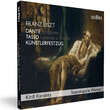















































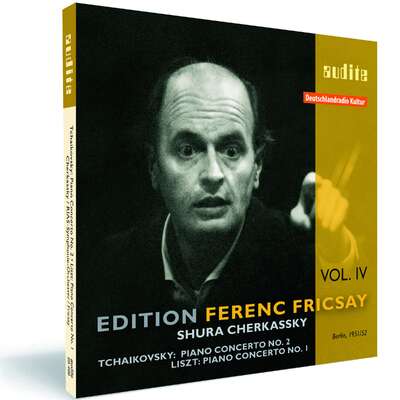


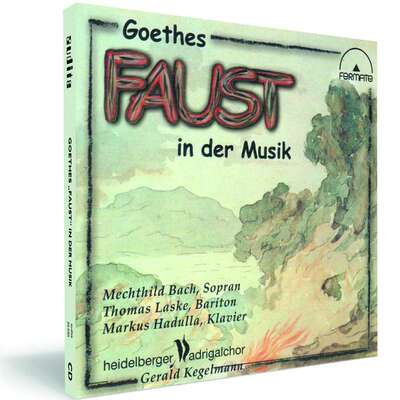


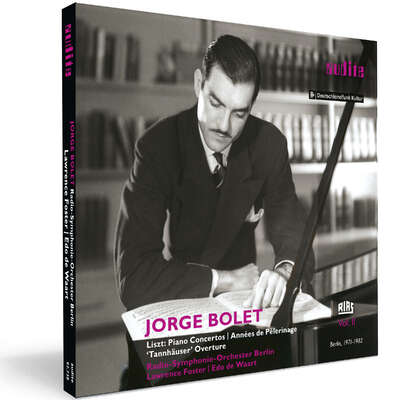

![23446 - k[NOW]n Piano](/image/product/3d/carousel/23446-known_piano.jpg)




